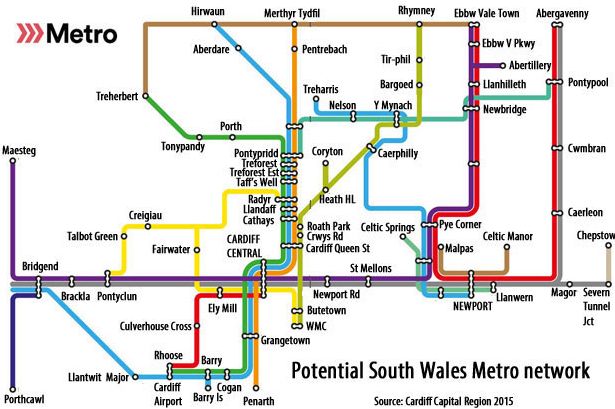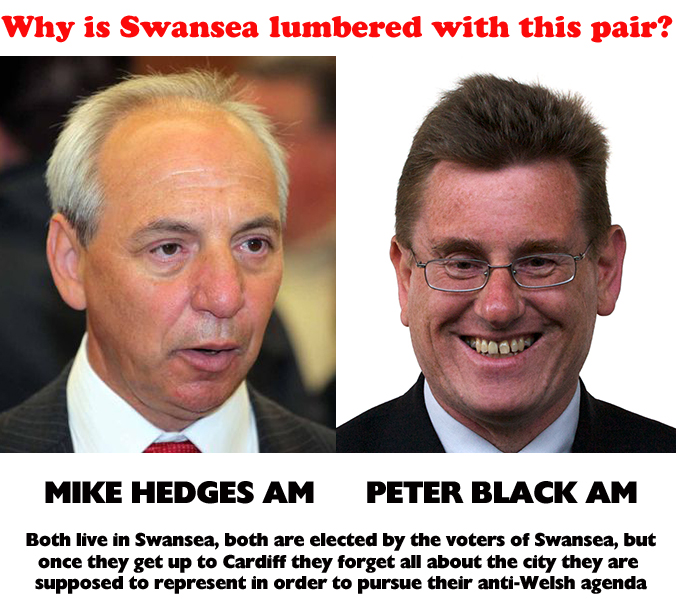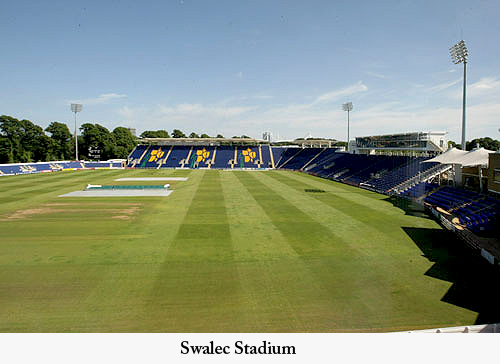PLEASE APPRECIATE THAT I GET SENT MORE INFORMATION AND LEADS THAN I CAN USE. I TRY TO RESPOND TO EVERYONE WHO CONTACTS ME BUT I CANNOT POSSIBLY USE EVERY BIT OF INFORMATION I’M SENT. DIOLCH YN FAWR
♦
![]() This post is a bit out of the ordinary, and rather personal. I felt it needed to be written as a response to those using the behaviour of a tiny minority to smear the reputation of my home city and its people. Also, in the hope of explaining why we have this minority.
This post is a bit out of the ordinary, and rather personal. I felt it needed to be written as a response to those using the behaviour of a tiny minority to smear the reputation of my home city and its people. Also, in the hope of explaining why we have this minority.
♦
NEVER JUST A GAME
A week yesterday, Swansea City hosted Cardiff City at the Liberty Stadium and beat the visitors 1 – 0. But the game itself was almost overshadowed by a few unsavoury postings on social media and incidents in the real world.
One widely reported posting concerned a ‘boarding pass’ for Emiliano Sala, the Argentine player Cardiff signed from Nantes, who was killed when the aircraft in which he was a passenger went down near the Channel Islands in January. (Available here if you want to see it.)
There was also criticism from certain quarters about union flags being flown by some Swans supporters – and their support for Glasgow Rangers and Ulster Loyalists – to imply that Swansea is a bastion of far right Unionism.

Passions are always high around these derby games, but many think that things have got worse in recent years. Which would be strange, for – isolated incidents of racism aside – football seems to be moving in the opposite direction, certainly with fewer cases of violence between rival groups of supporters.
So why is the rivalry getting more bitter and why have we seem a move to the Unionist far right from certain Swansea fans? The two phenomena are linked, as I’ll explain.
◊
MEMORY LANE
As stated, there has always been rivalry between the fans of the Swans and the Bluebirds. I speak as an old North Banker from the ’60s, when the old Vetch Field occasionally saw bigger crowds than the Liberty Stadium can hold today. A loyal supporter who was at Anfield for the 1964 FA Cup victory, and then suffered the disappointment of the semi-final defeat on a Villa Park quagmire.
I can still smell the cigar smoke from Christmas games and remember the crowd singing Roy Orbison’s It’s Over when the Swans went two or three goals up. (Which may not have been too often, I admit.)
But the point is, me and my mates supported the Swans and we supported Wales, and that was it. It was football pure and simple, no politics, no divided loyalties, no foreign causes.
In the days of which I speak there was a certain confidence to be found in Swansea, a belief that our town was every bit as good as Cardiff or anywhere else. Cardiff’s ‘capital’ status meant little. There were plenty of good jobs and you could tell the boss to do something physically impossible on a Friday afternoon and walk into another job on Monday morning.

It was the age of winkle-pickers or chisel toes and ‘Italian’ suits, the Mumbles Mile; while down the Vetch it was Herbie Williams, Jimmie Mac and Brian Evans. Good times.
Though I admit that in later years I often drifted to St Helens and the Whites, which was just a short walk away, but the Swans were never far from my heart. First love and all that, I suppose.
But that’s enough of Memory Lane, let me now try to explain why I believe we’ve seen the emergence of UDA supporters on the banks of the Tawe.
◊
A CITY BETRAYED
Despite the Swans making it to the old First Division under John Toshack for a couple of seasons in the early 80s, the confidence I just mentioned seemed to evaporate as the decade wore on and a number of factors contributed to a growing feeling that Swansea was losing out to Cardiff.
I’ve mentioned St Helens, that wonderful sporting arena on the Mumbles Road; not only was it home to Swansea RFC, but also to Glamorgan County Cricket Club. In fact, it was regarded as the natural home to GCCC seeing as the western part of the county and the adjoining area of Carmarthenshire around Llanelli produced most of Glamorgan’s players. And because the wider Swansea area was the home of Welsh cricket St Helens was where the county got its biggest crowds.

And yet, in a perverse decision that somehow foretold the future, GCCC gradually moved its centre of gravity east to Sophia Gardens (now the Swalec Stadium) in Cardiff, and St Helens was allocated fewer and fewer games.
A move that went hand in hand with Welsh cricket becoming less Welsh in every way. We saw fewer Welsh players in the team and the ‘Welsh’ cricket authorities willingly sacrificed our national team in order that Cardiff could host England test matches.
Then came the devolution referendum of September 1997, in which Swansea voted for devolution yet Cardiff – despite knowing it would get the benefits – voted against. I recall watching the late Hywel Teifi Edwards (father to the BBC’s Huw) being interviewed on television as the results came in and getting very angry about it, demanding that the Assembly should now go to Swansea.
What followed convinced many Swansea people that they’d been shafted.
It was always assumed that the new Assembly would be housed in Cardiff City Hall, but a bizarre dispute blew up between Ron Davies, then Secretary of State for Wales, and Russell Goodway, leader of Cardiff council. Davies alleged that Cardiff council was asking too much for City Hall, so negotiations ended and he launched a competition to find a different home for the Assembly.
The ‘winner’ was Swansea’s Guildhall, free since the new County Hall had been built on Oystermouth Road, and available at the right price. But none of that mattered – the Assembly ended up in Cardiff Bay.
All engineered by Lord Crickhowell, of Associated British Ports, which had benefited so handsomely from the public purse via the Cardiff Bay Development Corporation that had revamped ABP-owned Cardiff docks. Edwards had hoped to top it off with a new opera house, but lost out to the Millennium Stadium.

The Assembly would be an acceptable consolation prize (despite Edwards and his mates being opposed to devolution), especially as the new institution would be using Crickhowell House while the Assembly building was built. In fact, the self-styled ‘Welsh Government’ will be leasing Crickhowell House (or Tŷ Hywel, as it’s now called) until at least 2032.
The ‘dispute’ between Russell Goodway and Ron Davies was contrived, the ‘competition’ to find a home for the Assembly was a sham, both done to manoeuvre the Assembly down to Cardiff Bay. (All explained here in ‘Corruption Bay’, which I compiled almost 20 yeas ago.)
Swansea has been losing out ever since. A more recent example would be the decision to locate the major trauma centre for southern Wales in Cardiff, despite Swansea being geographically central, and Cardiff being so close to and already covered by the existing centres in Bristol. This decision was not made on medical or public health grounds. It will cost lives.
Now you might argue that other parts of Wales have lost out under devolution, and you’d be right. But nowhere is the sense of betrayal felt more keenly than in Swansea – because Swansea always had more to lose, and further to fall. And it hurts.
This failure of devolution has had consequences. As I shall now explain.
◊
THE FAR RIGHT CAPITALISES
Like everywhere else, Swansea has always had a far right element. But because Cardiff fans don’t carry Union flags and a small number of Swansea fans do there is, as I said earlier, an attempt to besmirch the whole city and traduce its people.
But how did we arrive at this situation?
Two decades of non-stop investment have reconciled most Cardiffians to devolution, while the influx from the west and the north – to fill some of the many well-paid jobs created by devolution – has also helped Cymricise the city.
Swansea, on the other hand, has taken a different route.
Repeated kicks in the teeth have left almost all Swansea people feeling that their city has been betrayed and abandoned. Some Jacks have responded by rejecting not just devolution but Wales itself, and by exploiting the prevailing frustration to draw impressionable youngsters into something very ugly.
Of course, it can be argued that issues such as the tidal lagoon, or the failure to electrify the railway line, were the fault of Westminster, not the Assembly. But London has always been there, big, wealthy, dominating; whereas Cardiff’s growth in prosperity and size are seen as a direct result of devolution, and at the expense of Swansea.
Which, predictably, results in a rejection of – and often a hatred for – Cardiff.
I first became aware of the Swansea Loyals ten or more years ago, from their website, which gloried in members’ visits to Glasgow and Belfast. And while earlier manifestations of the far right in Wales had sought to incorporate Welsh symbols and identity into an essentially English or British message, what differentiated the Swansea Loyals is their focus on Scotland and Ireland.
Of course the Loyalist tradition has its roots in Ireland, and is long established in Scotland, but totally absent from Wales, which serves to reinforce Swansea Loyals’ rejection of things Welsh.

It’s this that has angered so many on social media lately.
Maybe we need to remember that in the 1990s Cardiff was the capital of the far right in Wales, with ‘Wyn Davies’ and his Welsh Distributist Movement, the band Violent Storm and others. And who can forget footballer and Bluebirds fan Dai Thomas being arrested at Euro 2000. Was he there supporting England or just there for the violence? He was jailed a couple of years later for being a twat at a Cardiff game.
Despite Cardiff’s former pre-eminence, by the time the BNP membership list was leaked in November 2008 (Wales extract here) it was clear that Swansea had now stolen the crown 99% of the city’s population didn’t want.

So if you want to understand why a certain section of Swansea City fans wave Union flags and reject Welsh identity, why they identify with Glasgow Rangers and Loyalist paramilitaries, then the answer lies in a football rivalry being taken to another level by people of a far right political persuasion exploiting the fact that their city has been given a raw deal.
And because just about everyone in Swansea feels this way critics should be thankful that these Loyalists are so few in number. Swansea remains as Welsh as ever, but I doubt very much that the city would vote to retain this Cardiff-centric form of devolution if there was a referendum tomorrow.
◊
THE BIGGER PICTURE
Despite their protestations of being British, to most people in Wales and England there is something rather alien and off-putting about Loyalist flute bands, Lambeg drums and Orange marches. They seem to come from another place and a different culture. Maybe even a different century.
Yet during The Troubles Loyalism began to influence the far right in England. With that influence among England football supporters made clear time after time with the chanting of ‘No Surrender to the IRA’, which bemused locals in cities unlucky enough to have them visit.

Connections were made. And persist
The violence for which England football fans are notorious attracts the far right in Wales, and also perhaps those – like Dai Thomas – only interested in a brawl. Here’s another tweet from East Swansea Loyal, this one gleefully anticipating violence in Prague after England had lost to the Czech Republic last month.

The link between the far right and football violence is almost inevitable given the opportunities football provides to mix with and recruit pumped up young men looking for an outlet or a focus for their aggression. Which is why the armed forces provide another fertile recruiting ground.
But what’s wrong with that, they’ll argue, for only a ‘Fenian’ or a ‘separatist’ would complain about displaying the UK flag. And why shouldn’t guys from Swansea support Glasgow Rangers? Similarly, there’s nothing wrong with going to Belfast to socialise with others who believe in the Union (The fact that the hosts have a penchant for balaclavas and baseball bats is neither here nor there.)

Swansea City is not the only football club south of the border to have a ‘Loyal’ element. In recent years they have sprung up in a number of places, and for the same reason – the far right sees Loyalism as a cloak of respectability. Wrap yourself in the flag, sing GSTQ, attach yourself to mainstream Unionism, and you can get away with a lot more than you could if you were just a bigot without a cause.
But to what are they ‘Loyal’? Essentially, a system in Ireland that saw the indigenous population dispossessed and discriminated against, with this system maintained by violence. British imperialism in a nutshell.
There’s no question that the city of Swansea has had a raw deal in recent decades; but the culprits are in London and Cardiff, so the answers won’t be found in Glasgow and Belfast.
Which makes it a great pity that instead of fighting for their city a small number of football hooligans has decided to further damage Swansea by joining bigots promoting a discredited cause.
◊
LOOKING AHEAD
If you watched the recent BBC series Spotlight on the Troubles: A Secret History you’ll know that during that period Loyalist paramilitaries were armed and directed by the RUC, the British army, and the intelligence services. If you didn’t watch it, then I urge you to do so, it’s an excellent series.
The Troubles may be over but the British state faces new challenges. For Brexit has unleashed a wave of English nationalism, and also a response, which combined threaten to break up the United Kingdom. So there’s a good chance that the British state will employ the far right, Loyalists and the like, in the years ahead.
It’s been done before, not just in the Six Counties but also in England, after Roberto Fiore washed up in London in 1981 and became big pals with Nick Griffin. Fiore brought with him first-hand knowledge of cooperation between extreme right wing terrorists and state intelligence services.
There will be a Scottish independence referendum next year. The greater the likelihood of the Scots voting for independence, the dirtier the state will fight. And if there’s a vote for independence then it’ll be unrestricted warfare.
Across the water, there could be a vote for reunification. Which will not be welcomed by those the Swansea Loyals admire, so how will they react? They’ll probably resort to violence and they’ll have support from the far right in Britain, but will the state help them, or have they outlived their usefulness?
And what of Wales? We see a growing appetite for independence that cannot yet reach its potential because, a) it is too closely linked with a political party that has hit its ceiling, b) it dissipates its energies on diversionary issues, and c) it deters support by being doctrinaire.

But independence is the only way forward for Wales. And if Scotland votes to leave the UK then Welsh independence will surely follow. Which might provoke more than just angry tweets from the Swansea Loyals, and graffiti around the Station Inn.
To end on a brighter note . . . when we achieve independence our ‘Loyalists’ can move to the country to which they are really loyal – England. Because principled individuals like them couldn’t possibly remain in an independent Wales, and there’ll be little welcome for them in an independent Scotland or a united Ireland either.
In the meantime, let everybody understand . . .
The ‘Swansea Loyals’ do not represent my city or my people. They are a small gang of bigots and fascists who have cloaked themselves in ‘Loyalism’, turned their backs on Wales, and should be exposed for what they are.
Wales must be united under one flag; the flag of those who are loyal to Wales, and only Wales.
♦ end ♦















